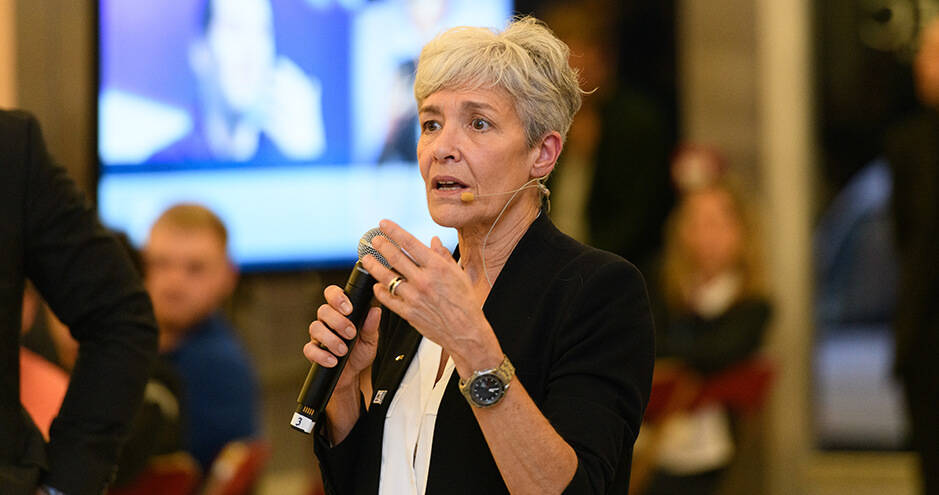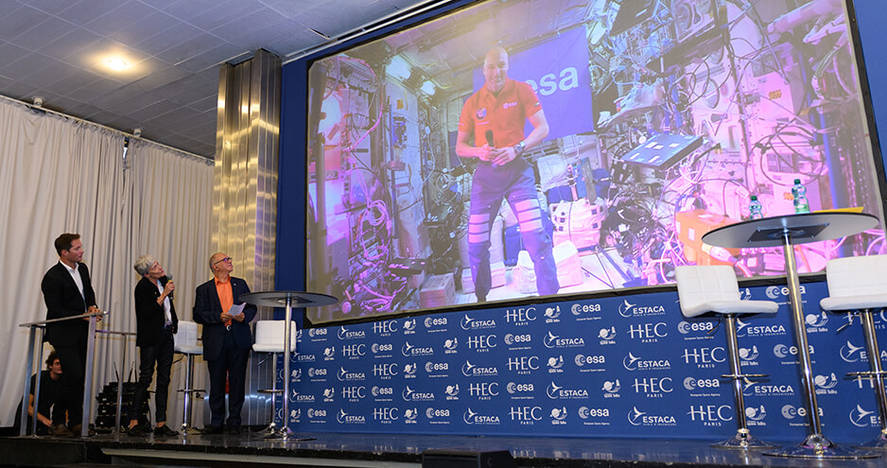Four Questions for Claudie Haigneré, Former ESA Astronaut
Former astronaut and current adviser to the European Space Agency, Claudie Haigneré, was France’s first woman in space. She shares with HEC her vision of the future in space and advices students of all disciplines to share in one of humanity’s greatest adventures. The exchange occurred days before NASA organized the first-ever all-women spacewalk.

You said man’s first walk on the Moon 50 years ago sparked your interest in space. You were 12 at the time. What do you think could attract students to space nowadays?
They are facing a changing landscape in space exploration. There are new actors, new destinations, new technology to take us further into outer space. We are exploring new horizons: beyond the Moon, Mars is our next challenge. This wind of change is very attractive to students. The spectrum for space endeavor as broadened so much in the past 50 years: you can be a jurist, an entrepreneur, an engineer dedicated to new material. Everyone has a role in exploring these new frontiers. We are talking about out-of-the-box - or can I say out-of-the-atmosphere - ways of thinking. Take, for example, the governance of a Moon village, a zone where we all live together and must manage resources and exploitation in a sustainable manner. We are all aware of the human heritage we represent. So it means you must find the right balance for the future between common goods and potential space economy. As I said, we’ll need more than scientists or engineers, we will need jurists, economists, philosophers, sociologists, geo-politicians, because there is a geo-political context to this venture by humankind. The field has become much more open. Furthermore, teams are needed on the ground. We were very privileged to be in space, there have been fewer than 600 people who have experienced space voyages. But behind them, there are teams on the ground who have been preparing the experiments we carried out. Nowadays, even creative people like artists have a place because it is an expansion of our humanity and it needs all of us to be creative for this inspirational endeavor.
You were chosen out of thousands of candidates to be part of two space missions in 1996 and 1999. What kind of people were selected at the time?
When I was selected to fly, there were already different kinds of profiles: military pilots, but also civilians – scientists like myself. I took advantage of this opening. I am a medical doctor and have a PhD in neuro-science. So it was a completely new paradigm. It was important to incorporate new ways of thinking, new ideas, to build space cooperation beyond space race. The Seventies were a period of heroes and pioneers and they were dominated by the military, by pilots and by men (except Valentina Tereshkova in 1963). They were inspiring but inaccessible “sky knights“. After a progressive opening to diverse culture and backgrounds – which remained institutional, nevertheless - we are now quickly entering a new landscape of cooperation between public and private entities for the next phase of human space exploration. In the intervening 20 years, space has become open to non-institutional entities and individuals: Elon Musk, Jeff Bezos, space tourists. Beyond exploration, we are entering a phase of sustainable expansion and potential exploitation where new expertise will be required on ground and on board.
How can HEC students contribute to this expanding field?
By working with HEC we will open up space to new communities that will share in the advancement of this sector. It is so powerful for us to take your lessons and innovative thinking in your fields. We have already seen this with our joint collaboration to create ESA-Lab, in collaboration with ArianeGroup. Beyond scientific objectives and innovative technological developments, our space community must combine with diverse non-space expertise to explore the full potential of the human space adventure. We could probably organize creative relations between students from the sectors of engineering and business with (fields like) the management of complex systems, complex societies and decision-making in a new space era. This will be a new input to the “desire of space” (in a generation born after the Apollo’s effect) and will provide a convincing argument for economic and political support for Europe's ambitions for space exploration and space applications.
They must become the voice of Europe in this field of space development, its applications, its enabling technology, exciting science, questions of safety and security, new economical markets and boundaries. The voice of Europe must be present in all these fields linked with the future and prosperity of humanity. I think we can do it together in this open, proactive and determined partnership. And we will take advantage of the notoriety, expertise and networks of schools like HEC Paris, allied to the involvement of ESA and the European community that it is part of, in order to strengthen the dynamism of cooperation and our expertise in this international competition.
Out of the 560-plus astronauts that have gone into space, only 64 have been women. This percentage remains constant right to this day, slightly more than 10%. You have said women can be an asset to space exploration but there is a form of self-censorship they exercise on themselves. What do you mean and what would you like to see - absolute parity?
There remains this imbalance in space. I’m not looking for 50% parity but 10% is just not representative of what women and men can do together in this endeavor, for humanity’s sake! In space, you don’t think about which gender you are or which nation you come from. You are a human being, impressed by the fragile beauty of this planet, home to the only known form of life today. You are joined together to enable humanity to go beyond the frontiers of knowledge and continue its adventure by pushing forward its boundaries.
But it’s true that, even if women have proven that they are able to fill all the positions right up to being commander of a station and have successful private and professional lives, they remain reticent in a world that is still too masculine and where clichés persist. The diversity and scope of the steps to be taken require all talents.
So maybe we need to change the story-telling narrative of the space endeavor in order to enlarge this human adventure. In a high-level technological and hostile environment, the narrative can still maintain the rationality, the rigor and the work that needs to be done; but we must keep open the desire of space to a multi-talented generation. To actively prepare for tomorrow, all talents and sensitivities must contribute to space exploration, that’s to say young people (men and women) with their differences and their complementarities.
Read also:
